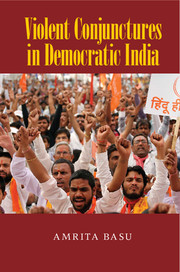'Amrita Basu’s richly researched, theoretically informed and multifaceted study revisits the question of the relationship between Hindu nationalism and communal violence. It breaks new ground by its nuanced and detailed examination of the relationship among federal states, party and social movement organizations.'
Susanne Hoeber Rudolph - William Benton Distinguished Service Professor of Political Science Emerita, and Lloyd I. Rudolph, Emeritus Professor of Political Science, University of Chicago
'This book presents a comprehensive picture of the Hindu nationalist movement in more than one way. Not only does it not separate its political façade, the BJP, from the rest of the ‘Sangh Parivar’ - that Amrita Basu pertinently analyzes in terms of a social movement - but it also does not insulate the electoral politics of the Hindutva forces from its use of communal violence whose facets (including the economic and caste-based ones) are deciphered via well-chosen case studies. The whole demonstration is administered with special references to four major states of India - UP, Gujarat, Rajasthan and HP - whose comparisons show unexpected variations.'
Christophe Jaffrelot - Professor, King’s College London and Sciences Po (Paris) and Research Director at the CNRS (Centre National de la Recherche Scientifique)
'Violent Conjunctures in Democratic India situates India’s now-reigning party, the BJP, in a deeply illuminating comparative perspective. Through her analysis of four Indian states, Basu offers a revelatory treatment of the BJP’s swings between ‘moderation and militancy'. Elucidating the too-rarely-investigated conjunctures of social movements and political parties, Basu’s work will be vital reading to Indianists and to students of global politics alike.'
Mary Fainsod Katzenstein - Cornell University, New York
'Amrita Basu brings the eye of the political scientist to local realities and the eye of the anthropologist to aggregate national patterns in this remarkable study of ethnic violence in India in the last four decades. Her ability to shift roles, views, and scales sheds new light on why the steady role of democratic institutions in Indian politics has been accompanied by party-led violence against minorities of every type in India. This study sets new standards for our understanding of the mass politics of hate and will be an invaluable guide to social scientists, critical humanists, and public intellectuals working on the paradoxes of democracy anywhere in the world.'
Arjun Appadurai - New York University
'This book should be read not only by those interested specifically in mobilization and social movements, but anyone who wants greater insight into the types of majoritarian politics that seem to be gaining momentum around the globe, most especially in democratic countries. Scholars of such topics will not find a single easy or simple answer to the difficult questions tackled in this book, but they can expect to find answers that actually explain.'
Rina Verma Williams
Source: Mobilization




